
Teaching Grief and Bereavement on the Palliative Care Diploma Course
![]() Cairdeas
Cairdeas
![]() 12th September 2023
12th September 2023
Blog written by Jenny Hunt (MA, Dip HE Palliative Care)
Meeting up socially with Dr Mhoira Leng while in Uganda in May 2023 turned out to be a pivotal moment for me. When she asked if I would consider travelling to Gaza to train on grief and bereavement on Module 8 of the newly established diploma in palliative care, I rather hesitantly agreed. Recent reciprocal attacks between Israel and the West Bank presented some safety concerns for me; my previous humanitarian palliative care responses had been post-natural disasters. Having been reassured that all necessary security information and support was available, I was surprised how rapidly and efficiently plans were put in place for my arrival to coincide with Mhoira and Anna Voeuk, another faculty member. Our transfer from Jerusalem through Erez crossing was seamless and our arrival at our family- run guest house accommodation, a pleasant surprise.
My approach to this training was informed by many years of working as a palliative care social worker at Island Hospice Service in Harare, Zimbabwe. In particular, as the Bereavement Service Coordinator, I was responsible for developing bereavement training modules and support systems for a wide variety of populations, professional and non-professional. My training experiences during this time led to the development of the 9 cell bereavement tool* which aims to raise awareness of grief and bereavement within the context of their communities, rather than deliver didactic material based on Western theories. I’m grateful to have been entrusted to use this same approach within the Gaza context with no guarantee that it would be applicable. I designed a simple PowerPoint presentation for the first day, providing an overview of some necessary, evidence-based information shared within interactive discussions. The value of drawing on their personal experiences was emphasized to provide authenticity to theories. Support was provided for any emotions that arose during this training.
The 9 cell tool was facilitated on day 2, beginning with active contributions to my request to hear what condolences are offered and received in this context, and which of these are considered helpful and unhelpful. Each participant then wrote a list of their own personal death losses on a strip of paper which enabled me to understand the levels and types of loss in the room. After reviewing the critical aspects of what had been covered on day 1 around the personal journey of grief lived out within social and cultural contexts, the participants were divided into 3 groups representing grief time lines from immediate to one year and beyond. Each group shared experiences of what is felt, what is shown to others and what is allowed and expected by one’s society, religion and culture. This information was then used for further discussion, identifying differences and unique stories all within a respectful, non-judgmental environment. Oral feedback confirmed that significant learning had taken place, and participants offered suggestions as to how they may now support the bereaved.
While there were so many aspects to this trip that deserve comment, the most powerful insight for me was the confirmation that despite cultural, political, economic, religious and geographical differences to contexts where this tool has been implemented elsewhere (Africa, India), it appears that improved bereavement support within communities can be achieved using this simple approach. It would also be useful to follow up this training with mentorship and modelling of some specific bereavement counselling techniques.
* Hunt J. (2002) The nine-cell bereavement table: a tool for training. Bereavement Care, 21 (3): 40-41.
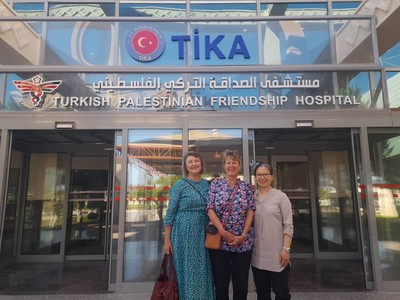
Faculty Mhoira Leng, Jenny Hunt, and Anna Voeuk in front of the Turkish Palestinian Friendship Hospital.
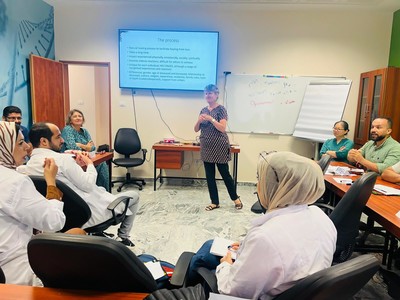
Jenny Hunt teaching the class during Module 8 instruction, August 2023.
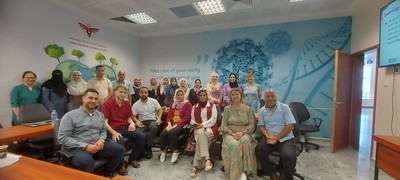
Group photo of faculty and students after the Module 8 instruction.
Building a Holistic Palliative Care Unit: Social Work Volunteers at PcERC
![]() Hannah Ikong
Hannah Ikong
![]() 24th August 2023
24th August 2023
With 53 years of experience volunteering in palliative care between them, these five social workers have seen it all.
As social worker volunteers with the Palliative care Education and Research Consortium (PcERC) in Kampala, Uganda, they provide the psychosocial support and assist the practical needs of patients receiving palliative care and their families in hospital.
Indeed, social workers Maria, Ronald, Teddy, and the affectionately named “Vicky 1 and Vicky 2” are a large part of the PcERC team and they each spend at least two days every week on the wards of Mulago Specialised Referral Hospital and Kiruddu National Referral Hospital.
Recently, I had the privilege of spending time with each of them, as we discuss their role in the unit, the patients and families on the ward, and the impact of palliative care.
I’ve quickly come to find out what all the social work volunteers can do in the PcERC team. They visit the patients between ward rounds and alert the clinical staff if there is any issue.
They listen, guide, and counsel the patient and family on topics from navigating around the hospital to reconciling with loved ones. While they are well acquainted with grief and bereavement, these never get easy and it can be an emotional challenge to continue their work sometimes.
Through their time with PcERC, they have been trained to help write wills and draft formal requests – and at the same time – have grown as educators as they bring homework and other assignments to children on ward missing class.
Holistic care really can be quite practical, as I learned from the social work team, and so their work can include picking up prescriptions or a meal for the patient. They also work with the PcERC administration to allocate their patient comfort fund towards purchasing items the patient and family cannot afford themselves.
During my time together, I kept asking, ‘Why palliative care? What keeps you volunteering with PcERC?’
For several of them, the palliative care team has become a family: one social worker’s spouse became quite unwell and needed counselling at one of the national government hospitals. Ever since that experience, that volunteer warmly remembers how the palliative care unit stood close to their family and supported them during and after the spouse’s hospitalisation.
Another volunteer shared on about a previous cancer diagnosis and their journey towards wellness; now, they want to offer the same compassionate and quality care to others who have cancer and other chronic diseases.
It is not a surprise, then, that the combined efforts of the social work volunteers with the clinical staff have a great impact on the patients and families.
One oxygen-dependant patient who was already hospitalised for two years, shared that she feels more “at home” at the hospital and less depressed after being referred to the palliative care unit. She even said that she has no worries at all: “I have got a special team to help me and to check on me on a daily basis … it’s to the extent of that I even forget that I am an orphan.”
Maria, Ronald, Teddy, Vicky 1, and Vicky 2 are also eager to share the impact that palliative care has had on them. Ronald, for example, cites the many trainings they have attended as well as the opportunity to learn and practice research skills. Likewise, several have observed that they’ve bettered as social workers and in their communication methods after joining PcERC.
Maria summarised one of her favorite aspects of volunteering with the palliative care unit: teamwork.
“I like the teamwork in palliative care,” Maria told me, “Which consists of doctors, nurses, social workers, and pharmacists. This teamwork is good because it encourages everyone in the team to contribute and work shared among all in the team. Palliative care is not a one man’s show. Two or more heads are better than one.”
We have certainly seen the benefit of the whole palliative care team in our partner, PcERC. Well done to each member of the unit, including the social workers who volunteer there.
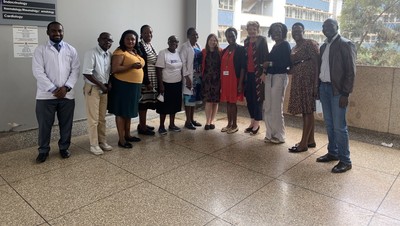
The PcERC team together by their clinical office at Mulago Specialised Referral Hospital.
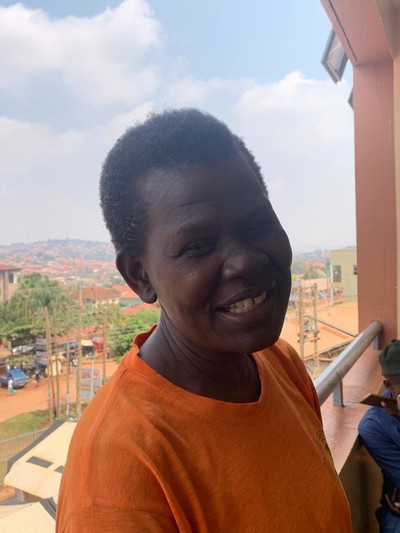
Maria is currently working at Kiruddu National Referral Hospital; pictured standing near the front awning.
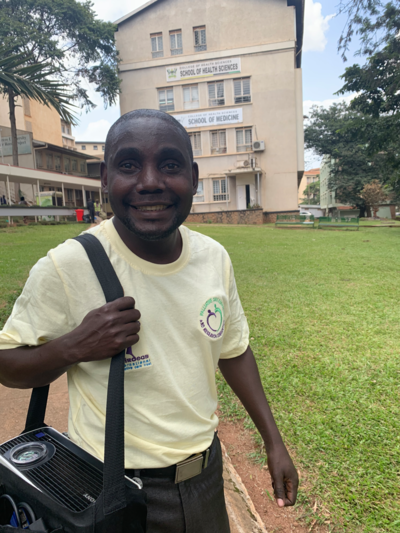
Ronald carrying the projector equipment needed for teaching medical students and outside the College of Health Sciences building, near Mulago.
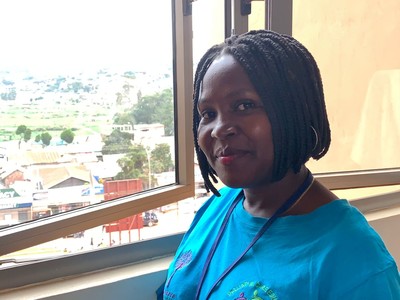
Teddy spends her time with patients and their families at Kiruddu Hospital these days.
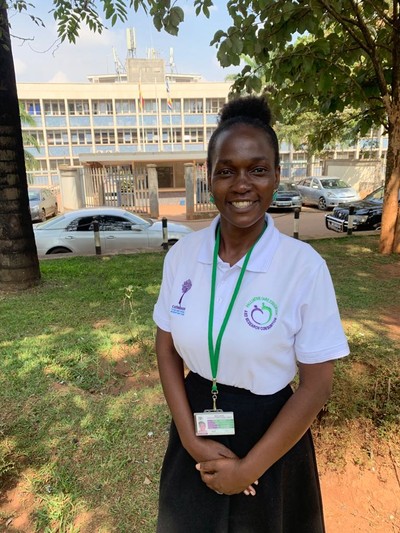
The first Vicky on the palliative care unit, who comes to support the unit at Mulago Hospital.
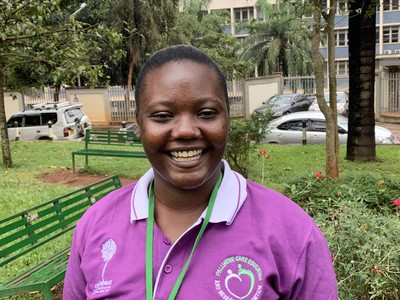
Last but not least is our second Vicky on the team, also working on the Mulago Hospital side.
Serving with love in a hurting world: ICMDA World Congress 2023
![]() Dr Mhoira Leng
Dr Mhoira Leng
![]() 12th July 2023
12th July 2023
More than 1000 people from 107 countries and all sharing one goal…’Serving with love in a hurting world.’
Every 4 years health care workers gather for a global conference for the International Christian Medical and Dental Association (ICMDA). This 17th conference was the biggest ever, the second time in Africa and the 60th Anniversary of ICMDA. Arusha gave a warm Tanzanian welcome to the many delegates from all corners of the globe.
Delegates could attend the student’s stream, the pre-conference stream as well as the main conference where a number of plenary talks, bible readings and myriad breakout sessions were on offer. Topics covered included climate change, demon possession and mental illness, decolonising health, sexuality, leadership, education and many more.
These reflected the breadth of interest and work with a focus on those marginalised or left behind in many societies and the need to rethink heath care in the modern age.
I was asked to lead one breakout session entitled; Palliative care; compassion in action.’ With a packed room and even folk sitting on the floor colleagues from across different settings through about the nature of hope, how that is relevant to understand and counter moves to medically assisted dying and how to integrate palliative care using a transformational model. We could have explored much more but it’s good to see palliative care on the programme and discussions are ongoing to increase access to training.
One talk stood out for me…Vinod Shah is a giant of health care. He has championed access to care for rural areas and strengthened primary care provision in India and beyond and I had the privilege of working with him in the distance learning department at CMC Vellore some years ago. He championed ‘refer less and manage more’ education for rural and mission hospital settings.
His talk ‘Justice in Healthcare Distribution’ examined health as a right, global inequalities and causes plus theoretical and practical ways to change this dangerous status quo. The most unequal societies; whether low income settings such as in many sub-Saharan African countries or high income setting like the USA have some of the poorest health outcomes.
Vinod Shah skilfully described how most of the current monetary systems simply drive poorer nations further into debt and require hard currency to serve that debt…a vicious cycle that further entraps. Using a redistributive model all can benefit. Those on low incomes, who previously were driven into further poverty by chronic illness, can have the protection they need for health and education. In turn they can start to generated wealth for their families and communities and in turn benefit the whole economy including the rich. He challenged us all…advocate for increased funding for health with a focus on primary care with a more flexible workforce. Work to achieve community- based insurance schemes and cooperative systems such as pharmacies. Then harness new technologies to rethink digital healthcare and home based care.
I also loved the joy and exuberance from our East African colleagues as they taught the rest of the world how to dance and sign during worship sessions. There were opportunities to showcase national cultures through dress, dance, food and song as well as pre and post conference travel opportunities in beautiful Tanzania. I think the Burundian’s captured many hearts with their dancing. I was able to meet new friends, including from Uganda, as well as reconnect with others. I appreciated the opportunity for in depth conversations and exploring vulnerability together.
A highlight was my visit to the ELTC headquarters in Arusha and meeting several previous mentees who completed BSc in palliative care at Hospice Africa Uganda / Makerere University. They are now leading programmes and inspiring others. I had forgotten to promise to gift me a Masi costume if I ever visited…but was overwhelmed at the generosity. Thank you for the wonderful welcome Simon Megiroo, Tusiime and Batholomew Bakhari.
The theme of the conference was inspired by verses in the gospel of Matthew 22:37-40. Jesus replied: “‘Love the Lord your God with all your heart and with all your soul and with all your mind.’ This is the first and greatest commandment. And the second is like it: ‘Love your neighbour as yourself.’ All the Law and the Prophets hang on these two commandments.”
At a time when nationhood is rising and divisions growing may we realise our common humanity. May we go from this conference refreshed, challenged, inspired and renewed in our vision to ‘serve with love in a hurting world’
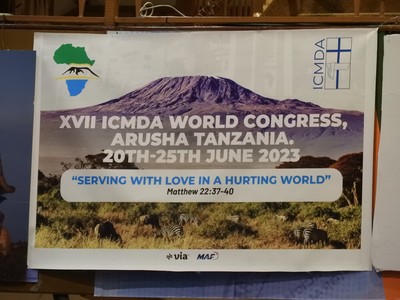
The theme for this congress was "Serving with love in a hurting world" (Matthew 22:37-40).
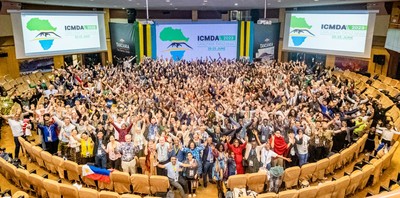
Participants at the ICMDA 2023 in Arusha, Tanzania.
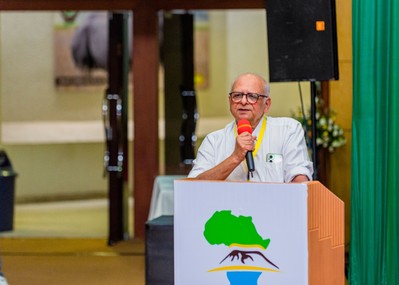
Vinod Shah speaking during the ICMDA 2023 conference.
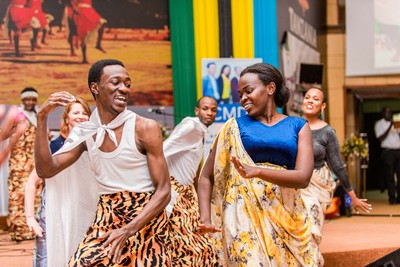
Burundian dancers perform during the ICMDA 2023.
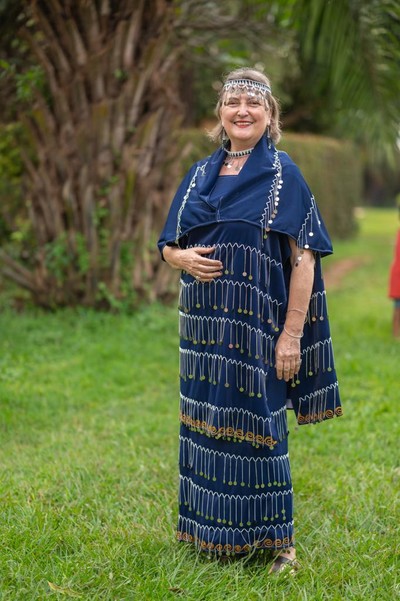
A gift from Simon Megiroo and family in Arusha: Masai traditional dress.
